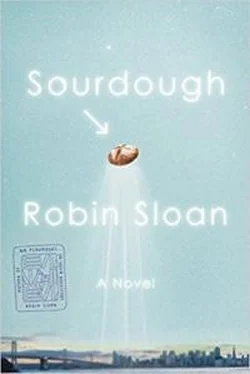“I envy you, Lois the Younger,” sighed Compaq Lois.
“No, no, she’s Computer Lois,” said Hilltop Lois.
“We all have names? Who am I?” Old Lois interjected.
There was a pause. “You’re Most Respected Elder Lois,” said Impeccable Lois, who was today wearing a tweed suit tailored close to her body with pleats of intimidating sharpness.
Old Lois sniffed. “I don’t like it. Anyway, I think she has to be Lois the Baker now.”
“The bread was awfully good,” Compaq Lois agreed. She flipped the last remaining sliver of fig into her mouth and looked at me pointedly. “See what happens,” she said.
The setting sun lit the house in orange and pink and it made all the Loises look great. Emerging from the bathroom, I caught a glimpse of myself in a hallway mirror. My hair was longer than it had been in years, and it glowed in the sunset, the ends alight like burning filament. Lois the Baker looked great, too.
Cars appeared. One was from the expedient internet car service and Compaq Lois waved as she stepped in, her bracelets glittering. The other cars were piloted by various Lois associates. Professor Lois’s husband read The Atlantic while he waited. Old Lois’s daughter helped her into the passenger seat of a Toyota, laughing at some quiet joke. Impeccable Lois’s girlfriend drove an old Ford pickup truck.
On top of the city with my Loises all around me, I felt a tremor of something. Was it possible?
I had become interesting.
I KEEP WRITING “the Mazg” like it’s such a definite thing. In fact, Leopold (my father) is Dutch. Shehrieh’s mother was Italian. Truthfully, Chaiman and I could, if we wanted, decide not to be Mazg. I have a cousin who did that. She makes dresses in Barcelona now. But Chaiman and I have … attachments. For me, it’s the food, and for Chaiman, it’s the music, and for both of us, it’s Shehrieh, who is Mazg through and through, whatever that even means. We are both always trying to impress her and not disappoint her, which can be a tricky combination.
THE GREATEST OF ALL THE MARKETS
I’D NEVER SEEN SO MANY PICKLES in my life.
We were lined up, a hundred of us, all with our samples like offerings for a queen or a newborn prophet. Boxes and baskets and bottles and jars—so many jars: some jars plain, others with clever labels already designed and printed in anticipation of a bright future at one of the Bay Area’s many markets.
Not all of those labels would be needed.
The woman in front of me was clutching a jar of Japanese pickled plums between her breasts, staring into space, moving her lips, subvocalizing. Rehearsing.
Behind me was another woman who seemed somewhat more serene. She’d brought a tall bottle of olive oil labeled with a strip of masking tape that read PICHOLINE. In a cardboard carrier, she had eight tiny blue tasting glasses shaped like tulips.
“It’s amazing, isn’t it?” she said, her eyes roaming the space.
The Ferry Building was more than amazing; it was mythic.
This grand structure on the city’s edge, perched on pylons, built a hundred years ago and in the middle of that century, not merely abandoned but actually walled off by a dark freeway that curled around the Embarcadero like a rampart. Then, an earthquake came and it was like something out of a fairy tale: the wall tumbles, the spell fades, and the townspeople realize what a gift they’ve possessed all along.
The Ferry Building was rebuilt, reopened. It was better than ever, and best of all on Saturdays, when it unfurled itself into a farmers market that filled up the plazas, reached out onto the piers. Trucks converged from a hundred miles in every direction carrying fruits, nuts, vegetables, flowers, fresh meat; the whole bounty of California. The sun glittered on the bay and the big bridge to Oakland bracketed the scene like a picture frame.
This was the greatest of all the markets, and basically no one in this line had a chance of getting a spot here. I’d learned this online, searching for information about the tryout. You started on the periphery and made your way to the bright bustling core.
It was Wednesday, so there was no market, but even during the week, the Ferry Building was a prodigious hub of gastronomical commerce. We petitioners were lined up on a catwalk above the building’s main concourse, where shops sold cheese and chocolate, beef and beans, knives and cookbooks and garden gloves. Midday sunshine streamed in through skylights that ran the length of the building. Tourists and locals alike gathered around Greenlight Coffee, watching the baristas take their time.
In San Francisco, there is a particular trajectory available to food-related enterprises. Your little venture—maybe it’s called Greenlight Coffee!—begins with a ramshackle cart at the outermost corner of a far-flung farmers market. Colma: market of the dead. In a year or two, having established your dedication, you are invited to the Ferry Building. This is your audition. The right person sees you—and the right person is assuredly here, canvassing the stalls—and you are springboarded, granted a small storefront in a rapidly gentrifying neighborhood. If the storefront is successful—if it assists with the greater aims of gentrification, is written up in national food and/or lifestyle publications, including, ideally, The New York Times (the local paper can’t help you here)—then you will be permitted to open a larger, more boldly designed flagship along one of the city’s Certified Cool Thoroughfares. In a few years, you will have expanded into a few additional locations, including a permanent spot in the Ferry Building—a gleaming café bathed in that midday light. You will have become a celebrated local mini-chain. Finally, you will sell your company to Starbucks for nineteen million dollars. And remember: You began with the cart at the outermost corner. You began here, in this line.
That’s why I was petitioner number forty-three, with more people behind me than in front. This tryout occurred once a month. We would have had better odds applying to Stanford as adult learners.
When I reached the front of the line, a bright-eyed Ferry Building functionary explained what I was about to experience. The deal, she said, was this: Three minutes with the panel. Offer a taste; just a taste. Explain what makes you different. Be eloquent but concise but confident but deferential. Much of this is beyond your control; if you make pickles but the markets are overflowing with them, it won’t matter how great your pickles are.
The woman with the Japanese pickled plums was inside now.
The loaf I had baked that morning had cooled completely, and suddenly I wished I’d carried it in some kind of insulating sleeve. But then, I supposed, it might have turned soggy. How do you store and transport bread? I didn’t know anything. That was the absurdity of this: I was standing in line with people who were masters of their craft. People who pickled plums, pressed olives, raised chickens, kept bees. I was just lucky: gifted with good raw materials and, perhaps, charitably, a sense for how to use them.
The Clement Street starter was waiting back at my desk.
“Smells good,” the functionary said, catching a whiff of the bread. I wished suddenly that I’d brought the starter itself. I wished I’d trained it to sing on command. I could have put it in front of the panel and said, Have you ever seen anything like this?
The functionary explained that the panel would taste my sourdough and hear my plea, then announce its market placements later in the afternoon. Placement was conditional on my willingness to sign certain agreements and also on certain logistical double checks that she, the functionary, would make. If I wasn’t placed anywhere—well, most of the people in this line had been turned down many times already. You can always try again, the functionary said. You were allowed to return once a season. People applied and reapplied, groveled and waited, for years. The Greenlight Coffee people had done that. Nineteen million dollars.
Читать дальше










